From snapshots of kids on Star Wars sets to a trio of small dogs trotting by a table bearing an Emmy statuette, the Hamill home gives a sense of the down-to-earth partnership and family life behind an out-of-this-world career in entertainment. For USC Leonard Davis School supporters Marilou and Mark Hamill, living and aging well calls for lots of love and laughter, the ability to let little things slide and an understanding of what matters most to them.
Keeping Family in Focus
Married since 1978 and the parents of three grown children, the Hamills have always made family their first priority, says Marilou, a member of the USC Leonard Davis School of Gerontology Board of Councilors. Her biggest piece of advice for younger people with children: Slow down and enjoy being in the moment with your kids.
“I know I enjoyed my kids, but I just think, gosh, it went too fast. People often say that to young parents — ‘Enjoy it because it’ll go so fast’ — but do they really get it?” says Marilou, who met Mark during her career as a dental hygienist before leaving dentistry to focus on starting their family. “I wish I could have a little time machine and go back just for an hour here and there in their lives and relive it again.”
Even as Mark’s career as an actor took him across the country and overseas, Marilou and the children — Nathan, Griffin and Chelsea — would accompany him whenever possible. Staying connected was paramount.
“We were always together; I would never go off and just not see the family shooting something for months and months,” Mark says. “You have to stay engaged with your children and listen to them as separate people. I’m proud of the fact I have three grown children that don’t all hate my guts — that’s an accomplishment, right there.”

Photo/Christina Gandolfo
A Spotlight on Aging
Advocating for causes close to their hearts has also been an important part of their life together, and their number one involvement with charities is for education, Marilou says. She is active in a wide range of community and educational organizations, including USC, daughter
Chelsea’s alma mater (BA ’11, MCM ’13).
An invitation to visit the USC Leonard Davis School, where Marilou toured laboratories and spoke with faculty about their cutting-edge research, played a big part in their decision to support the study of aging, she explains.
“I was just fascinated with the research that the faculty are doing, and with the fact that I was getting older and not younger, it just became a perfect fit,” Marilou says.
Marilou and Mark are 68 and 72, respectively. She also notes that a friend younger than her is living with Alzheimer’s disease, so the impact of aging is not far from her mind.
“A very popular saying is, ‘You’re as young as you feel.’ I think we feel young, and then you look in the mirror — or what really gets me is a video,” she says.
And, of course, aging is a complex topic throughout the entertainment industry. Mark has had the unique experience of portraying his most famous character, Star Wars hero Luke Skywalker, at both younger and older points along the lifespan in the franchise’s feature films. He also played a younger version of the character in the series The Mandalorian with the aid of sophisticated digital technology.
Reprising his role as Luke in Star Wars Episodes 7, 8 and 9 presented an important opportunity to portray aging onscreen, he says.
“I just thought it was healthy for young people, especially, to see the natural process of aging, because you’re frozen in time and your life goes on, and yet they keep showing pictures of you when you were 24,” Mark says. “That was the most appealing aspect of going back to that character — that you could then see him in his 60s.”
Reflecting on his decadeslong career also offers a lesson in not limiting oneself with predetermined notions about what it’s like to get older, he adds.
“As Alec Guinness put it to me in a letter, ‘Ah, the ravages of old age’ — he was talking about having some sort of surgery. And it’s ironic, because when I worked with him, he seemed like a grandfather to me; he seemed like an older man,” Mark says. “And then someone pointed out to me, ‘When you came back to do the first sequel, you were the same age or a year older than Guinness was in the original Star Wars.’ That was kind of shocking to me, because your view of what you’re going to be like in 20 years doesn’t really match up. At 20, I didn’t imagine what I would be like at 40 or 50 or 60 until I got there.
“And that’s the surprising thing — you don’t suddenly change. You’re the same person. You might have to accommodate certain physical limitations or the fact that you don’t see or hear or remember as well as you did. But it doesn’t change who you are as a person.”
A Supporting Role in Gerontology Education
Along with the USC Leonard Davis School Board of Councilors, Marilou is a current member of the USC Associates Board of Directors, the Town and Gown of USC Board of Directors, and is the vice chair of the USC McMorrow Neighborhood Academic Initiative Board of Councilors. She has been honored with numerous awards for her volunteer work, including the USC Alumni Association’s Widney and President’s awards, and in 2020, Marilou was also inducted into the prestigious USC Skull and Dagger.
As part of their mission to help students realize their educational dreams, Marilou and Mark have created scholarships at several institutions, including at the Crossroads School for Arts and Sciences, Los Angeles City College, USC Annenberg School for Communication and Journalism, USC School of Dramatic Arts, and Town and Gown of USC. Most recently, the couple established the Marilou and Mark Hamill Family Scholarship at the USC Leonard Davis School of Gerontology.
“I love the Leonard Davis School of Gerontology! The school has several of the most highly cited researchers on the planet, and it’s just fascinating what they’re doing and continuing to do,” Marilou says. “Dean [Pinchas] Cohen is just amazing, and I’m happy to be involved. We love helping students that maybe wouldn’t have the opportunity to attend gerontology school; I really am pleased to help students that otherwise might not have the chance to go to USC.”
In October 2022, she and Mark were recognized for their support of gerontology education with the Dean’s Medallion, the USC Leonard Davis School’s highest honor, at the school’s annual Scholars and Benefactors Luncheon.
“There’s no greater gift than education,” Marilou said in her keynote remarks during the event. “The gift we give them now will pay off over and over. We’re investing today in the leaders of tomorrow.”
Mark also addressed the crowd of students, faculty, and supporters during the luncheon, taking the opportunity to laud Marilou and her service to USC.
“I am so fortunate to do what I love to do with the best partner I could have,” he said at the time. “This is another item on the list of reasons to admire Marilou.”

Photo/Steve Granitz (WireImage)
Flipping the Script on Getting Older
While much of society’s wider conversation on aging deals with declines and limitations, both Marilou and Mark say that getting older can be freeing.
“You learn to not sweat the little stuff. And Mark used to always say that to me, but I’d worry about everything,” Marilou recalls. “Now, it doesn’t matter. If I can’t find something, I’ll find it, or I won’t. Who cares?”
“That’s the motto of my life,” Mark adds. “Who cares? Nobody! So just get over it and enjoy life. Life’s too short and then you die; it’s really a terrible ending for anybody that’s paying attention. But the longer you’re here, the more you appreciate what you have.”
Among the best parts of getting older: less self-consciousness, less worry about ultimately inconsequential things, and a greater appreciation for what really matters, according to the couple.
“That’s why people say, ‘Live in the moment,’” Marilou says. “You sometimes wonder, ‘I’d like to know when I’m going to die.’ And they say, ‘No, you don’t; just live every day as it’s your last.’ And that’s what you’ve got to do.”
“I’m just happy to be here because the alternative is so much worse,” Mark adds. “One thing that’s great about getting older is the older you get, the less you care in terms of, ‘Oh, how am I coming off?’ It’s one of those things where you’ve earned the right to be the way you want to be.”





